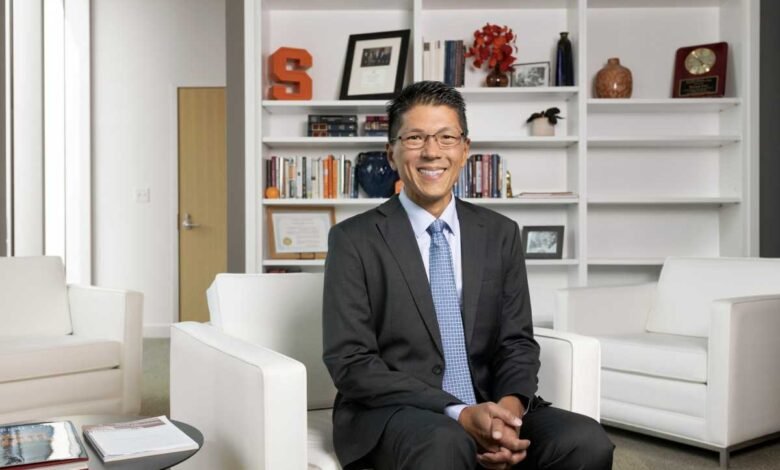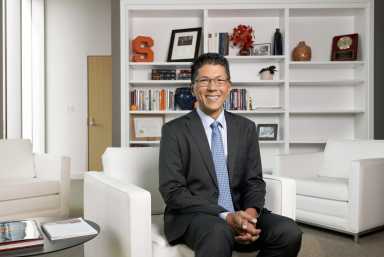Syracuse Law School Dean Terence Lau brings business acumen to his alma mater


In the world of legal education, Syracuse University College of Law Dean Terence Lau’s background is an unconventional mixture of business and academia.
But those skills are exactly the ones a law school dean needs.
“I wish more deans had the opportunity to move across disciplines,” Lau told amNY Law. “It’s been one of the most formative and informative experiences I’ve had as a leader.”
Last summer, Lau became the 13th dean of Syracuse’s law school and the first-ever alumnus to take the position. But while Lau’s background as a Ford Motor Company attorney-turned business college leader bucks some law school norms, his approach parallels key aspects of the school’s law program.
Lau said his less-traveled path to becoming a law school dean has helped him straddle the technical and the human aspects of the job. being a dean. Ultimately he’s in the people business.
“The dean’s role is to be a bridge between students and faculty, alumni and the university, tradition and innovation,” Lau said. “It’s about setting a vision, securing resources, and creating an environment where faculty can teach and research at the highest level while students can thrive personally and professionally.”
While in recent years the position of law school dean has become much more diverse in terms of gender, race and ethnicity, the profession is quite homogeneous when it comes to prior experience. Research shows 81 percent of deans previously were law school faculty.
Lau’s interests were never limited to law. Before he decided to go to law school, he had started to train to be a commercial airline pilot. After his years of corporate counsel post-graduation, he went on to teach at and then lead a business college in California — a position that taught him business discipline. As a leader, he subscribes to the military philosophy of “leaders eat last” — an approach that seems to complement Syracuse’s robust veterans program.
For several decades, the university has positioned itself as a leader in veteran affairs and international security, a top producer of Judge Advocate General (JAG) military lawyers — an approach that dates back to the university’s tragic connection with the 1988 Lockerbie bombing, when 35 Syracuse University students were among the 270 people killed in the bombing of Pan Am Flight 103 over Lockerbie, Scotland.
Syracuse University College of Law is also known for its strong trial advocacy program and its expertise in fields such as disability and new technology law. The school emphasizes experiential learning, offering in-house clinics, externships and advocacy competitions, and was the first in the country to launch an online program — something Lau sees as a seismic shift in legal education.
Leadership philosophy
Lau graduated from Syracuse Law in 1998 and spent five years as an in-house lawyer at the Ford Motor Company before transitioning to higher education, where he served a business professor and dean at the University of Dayton in Ohio and College of Business at California State University, Chico for over 20 years.
The business environment shaped his approach to leadership, he said, because their responsibilities overlap.
“The business disciplines themselves lend themselves well to being an administrator because the disciplines of which I taught in many business classes include management, organizational behavior, strategy, finance, economics, accounting, information systems and decision sciences,” he said.
According to Syracuse’s press office, when his predecessor Craig Boise announced he was leaving, Lau initially got involved in finding a replacement as a board member on the search committee. It wasn’t until later that the rest of the committee, impressed by his insight, approached Lau as a candidate. Lau said the deanship with his alma mater was an irresistible opportunity.
Syracuse law professor Todd Berger, co-chair of the dean’s search committee, honed in on Lau’s business expertise.
“It gave an insider-outsider quality that made him a very intriguing candidate,” Berger told the press office.
But to Lau, business science is secondary to the social part of the job.
“Everyday that I go to work, I tell myself: people, people, people,” Lau said. “So first and foremost, being a dean is recognizing that we work with people, whether that’s faculty or staff or students or parents or other university administrators.”
Having said that, he went on to describe the student’s personal growth in financial terms.
“At a car company, your assets are intellectual property, tooling, plants, equipment and so forth. Well, at the university, we have none of those. All we have are people,” Lau said. “People are assets and assets are things that you nurture and grow.”
People management is a transferable skill across different academic disciplines, he added, acknowledging that people can be “messy” and that understanding their behaviors, especially under stress, is crucial.
As for his role as the leader of school, however, Lau holds himself to a higher standard of discipline.
“In the military, generals eat last and enlisted people eat first at meals. I believe in that. I believe that for myself and for leaders, we have to put other people ahead of us,” he said.
Syracuse’s specialization and reputation
The fact that Lau has taken lessons from the military service goes back to his experience as a graduate from Syracuse Law’s campus, which is widely known for its veterans program. In the wake of the Lockerbie bombing, Syracuse strategically built out its programs in veterans affairs and international security. The campus’s “awakening” around those areas goes back to that incident, Lau said.
“It has indelibly changed who we are as a campus,” he said.
The law school’s Security Policy and Law department covers fields of national security, counterterrorism, cybersecurity and intelligence law. Its alumni have gone on to work as counsel for the U.S. Navy and Department of Defense, IT consulting for the federal government or non-governmental organizations like the International Medical Corps focusing on international issues.
Its veterans initiative include a legal clinic that assists veterans and their families with VA benefits, the nation’s only military law moot court competition based on the Uniform Code of Military Justice and a focus on training JAG lawyers.
This is not to say that the whole program’s focus is on veterans or national security law. Many graduates land positions at big law firms and other government agencies, nonprofits and corporate legal departments. As of April 2024, 97.8% of the class of 2023 were employed in the field of law or pursuing graduate studies, Lau said.
Future of the school
When it comes to the school’s future, Lau sees its online J.D. program, which launched in early 2019 as playing a major role. It’s a point of pride for him that while there were several law schools that launched a similar program in the fall of that year, Syracuse did it first in the spring.
In that time the program has grown by almost 400%, he said. He considers it the most consequential change to legal education in recent history, providing access to legal education for groups of individuals who historically could not pursue a law degree because they could not afford to leave a job.
“The online JD program, our JD [Interactive] program, has taught us that you can [become] a lawyer and be stationed on a military base in Okinawa,” he said. “You can [become] a lawyer and be a pediatric surgeon in Boston. You can [become] a lawyer and be a police detective in New York City.”
Lau has also said he wants to add new areas of legal education in the coming years and to increase the number of full scholarships the law school provides. As someone who relied on a scholarship as a student, he said that affordability was a key pillar of what brought him to the school. He suggested that the obstacles he had to his career trajectory help him appreciate the American legal system in a more profound way.
Lau’s family emigrated to the U.S. from Malaysia when he was 16 because of his father’s work. This experience, and the year he took from academia to serve as a U.S. Supreme Court fellow, instilled in him profound faith in “the genius behind the U.S. constitutional scheme.”
“I’m confident for generations to come. I have a very, very sanguine belief in America,” Lau said. “I think because I’m a lawyer, because I’m a dean, and because I’m an immigrant, that’s what informs me and that keeps me going.”




